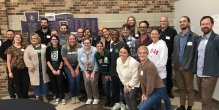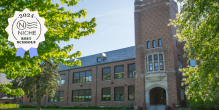Lasallians Without Limits: Faculty and Staff In-Service Focuses on Racial Justice in Education
Kevin Lally'98, English Department
November 8, 2017
The faculty and staff of five Lasallian high schools in the Twin Cities came together on October 23, 2017, to focus on Racial Justice in Education. More than 400 educators from Benilde-St. Margaret, Cretin-Derham Hall, DeLaSalle, Holy Family and Totino-Grace participated in the day-long in-service.
Dr. Marcia Chatelain, Associate Professor of History and African American Studies at Georgetown University, was the featured speaker. She discussed how the national climate around race and injustice has shaped schools, from classroom discussions to discipline issues.
The day incorporated reflections on Ferguson, Missouri and the Philando Castille shooting in the Twin Cities area, which has reignited a need for educators to consider their practices and leadership and how this is balanced by our Catholic mission.
For more information, read The Catholic Spirit coverage of this event.
The faculty, staff, and administration from the five Lasallian schools in the Twin Cities gathered at Benilde St Margaret’s for a workshop on facilitating difficult conversations about race. We were led by Dr. Marcia Chatelain, a nationally renowned speaker and scholar on the topic from Georgetown University, in addition to a lifelong Catholic and the product of Catholic schooling (Jesuit schooling, but we let that slide).
Presentations on racial diversity can be calibrated between the extremes of making folks feel better about race without naming ongoing racial tensions on the one hand, and pushing so deeply into those tensions that attendees feel attacked and disengage as a result on the other.
Dr. Chatelain’s presentation for LaSallians without Limits managed to thread this delicate needle. By sharing her experiences and scholarship as well as the experiences of her students of color, she helped us understand and gave us strategies for how to think about facilitating conversations about race while not ignoring their difficulty. Her approach was rooted in a compassionate understanding of the ‘Other,’ the Dear Neighbor, whom we encounter. She encouraged us to better understand the context, both historical and personal, that informs student speech and action, to listen and truly hear students even if we find their views offensive, and to provide a model for civil conversations about difficult topics as there is precious little of that in our lives.
I found her workshop to be powerful and potentially transformational. As I cannot whisk you back to experience it with me in a time machine, nor can I do justice to the compassion and vulnerability she extended to all of us, I will try to name some of what stood out to me from her talk:
- We can help and we can harm, but we are always impacting our students.
- With maps showing ongoing racial segregation and ongoing national debates ranging from racial violence to politics to football games, we cannot ignore that our students are living through a time of heightened racial tensions.
- While there is no “right” or “wrong” way to navigate these difficult conversations, we can choose to act with compassion toward our students by being better educated about how race has worked historically and in our lives. We can learn more about histories of redlining and workplace discrimination, civil rights movements, and how white people have supported and resisted those movements.
- Recognize that there is pain, that people (including us as teachers!) will feel vulnerable when talking about race. Dr. Chatelain told us that even she gets nervous when talking about race – it’s hard to do! But with or without our guidance, our students will have to contend with race.
- Create space and time during the school day wherein we can foster meaningful relationships with each other and our students.
- Recognize that enacting our Catholic Social Teaching values by making our schools more racially equitable can cause waves in our communities and among our donors. We must work to clarify our mission and values to our constituents to encourage them to support our work to be leaders in our communities.
Social Justice work and relationship-building in our communities are at the heart of Catholic Education, and they are central to our Mission and Values at Cretin-Derham Hall.
Like so many of our peer schools, we have work to do so that we can better support all of our students, especially our students of color, around race.
Earlier I mentioned that her presentation was powerful and potentially transformational. While Dr. Chatelain helped me to recognize the importance of these difficult conversations and gave us tools with which to start having them, it would be all too easy for me to feel grateful for the wonderful presentation – the best in-service in years, according to more than one colleague – and return to the false comfort of ignoring race. It is much more difficult to participate in the self-examination necessary to better understand my students’ experiences.
As Dr. Chatelain challenged us: What am I willing to do and what have I done to contend with racial discrimination? How much harm am I willing to commit in order to keep what I have? In our culture of scarcity, what do I not have enough of that causes me anxiety about the ‘Other?’ And then, how can I be present to the pain and discomfort that my students of color experience?
My colleagues and I were grateful for the opportunity to learn from such an impressive speaker. While we continue to engage in this important work, we can be proud of our commitment to our Catholic Values.
My colleagues and I were also excited about and grateful for the chance to sit, converse, eat, and work with our counterparts from other Lasallian schools. This was a rare opportunity for us, one that I hope we will have again soon. Finally, I want to express our gratitude to Sue Skinner, Benilde-St. Margaret’s principal, and the staff and students at BSM for hosting us all so graciously. It was no small effort on their part and it did not go unnoticed. I am eager for our Lasallian community to engage collectively in this important work.
Subscribe to our e-Newsletters
You might also like:
Get to know the CDH Athletics Department: Part Two
Get to know Matt Funk, Athletic Director, and associate assistant athletic directors, Bob Kinne '11, Tony Yazbeck, and Tara Seifert.
CDH Welcomes New Faculty/Staff from Local Catholic Schools for Lasallian Formation
CDH recently hosted new faculty/staff from Catholic High Schools in our community for an introduction to the Lasallian mission and as an opportunity to meet those from the other schools.
CDH Named Second Best Catholic High School in Minnesota by Niche
Niche gave Cretin-Derham Hall an overall A+ grade.




